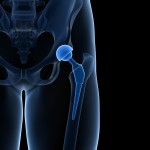
Do you know that over 1 million hip replacements are carried out each year? The majority of Total Hip Replacements are for people with severe arthritis of the hip that causes pain and reduction in function. We elves wanted to know for someone with osteoarthritis of the hip what are the medium term health related quality of life impacts from having this operation. A recently published systematic review helps to answer this question. Let’s have a look at what they found.
Here’s what they did
The authors searched the PubMed, MEDLINE and EMBASE databases up to Dec 2012 for studies published after January 2000 in English where all patients were over 18 years of age, with OA as the primary indication for surgery, total hip replacement as a primary procedure, outcomes with a mean or final post-operative follow-up of at least 3 years, and disease-specific and/or generic Health Related Quality Of Life data recorded.
Two reviewers independently assessed and extracted data from studies. Risk of bias and publication bias were assessed.
Here’s what they found
20 studies were included (5 were excluded from the meta-analyses due to low quality).
Total Hip Replacement was performed on patients with a primary diagnosis of osteoarthritis (mean/median age: 54 to 91.5 years).
Mean or median follow-up period of included studies ranged between 3 and 12.8 years.
There was significant improvement in Health Realted Quality of Life up to 7 years post-operative compared with pre-operative status.
Disease specific outcomes: Most studies indicated that post-operative WOMAC and HHS scores were superior up to 16 years compared to baseline
- Total Harris Hip Score (HHS) (P < 0.00001)
- Combined domains of Western Ontario and McMaster Universities Osteoarthritis Index (WOMAC) and HHS: pain (P = 0.00001) and physical function (P < 0.00001)
Generic outcomes Medical Outcomes Survey Short Form 36 (SF36): scores were equal to or better compared to patients’ pre-operative state in most or all domains for up to 10 years
- Physical functioning (P < 0.00001), bodily pain (P < 0.00001), role physical (P = 0.001), role emotional (P = 0.04), and social functioning (P = 0.03).
- General health (P = 0.29), mental health (MH) (P = 0.43), and vitality (P = 0.17)
Common predictors of worse outcome (4 studies) were female sex, older age, and pain reported at other sites. Better baseline PF, hypertension (HTN), living alone, and no post- operative employment may also influence HRQOL.
Patient satisfaction and functional status was favourable. There was significant heterogeneity amongst all studies, but publication bias was low in pooled analysis.
The authors concluded
Mid-term HRQOL following THR (1) is superior to pre-operative levels in a broad range of HRQOL domains, (2) can reach the levels of reference populations, and (3) results in good patient satisfaction and specific functional gains.
The Musculoskeletal Elf’s view

It’s good to know that health related quality of life improves significantly in the first 2-3 years and then plateaus and is maintained for 7-16 years post operation. It should be remembered that any complications resulting from surgery typically occur within the first 2 years. This review only looked at studies measuring effects at 3 years onwards, this could over inflate the findings of this review.
The authors of this review also report that patients were satisfied with the results of their surgery as well as their ability to undertake activities of daily living and that health related quality of life was equal to reference populations so good news all round. A reference population is one of similar age, gender, ethnicity mix but who are generally in good health. These reference populations are compared with populations of people with medical conditions.
What do you think?
- Have you had a total hip replacement? Are you experiencing improvement in pain and function compared with before the operation?
- Are you suprised that post-opertaively health reated quality of life is at least equal to reference populations?
Send us your views on this blog and become part of the ever expanding Musculoskeletal Elf community. Post your comment below, or get in touch via social media (Facebook, Twitter, LinkedIn, Google+).
Links
- Shan L, Shan B, Graham D, Saxena A. Total hip replacement: a systematic review and meta-analysis on mid-term quality of life. Osteoarthritis Cartilage. 2014 Mar;22(3):389-406. doi: 10.1016/j.joca.2013.12.006. [abstract]


RT @MSK_Elf: Health related #QualityOfLife 7 years after total #hip replacement http://t.co/EjlkHo8vzc @PhysioAOCP @effortnet @BritOrthopae…
Interesting article. Health related quality of life after total hip replacement https://t.co/RGHJwYPZsd via @sharethis
Health related quality of life after total hip replacement http://t.co/KP6wcaaZEI
Health related #QualityOfLife 7 years after total #hip replacement http://t.co/EjlkHo8vzc @SympoOrthopedic @OrthoEvidence @ndorms
What is Health related #QualityOfLife after total #hip replacement http://t.co/EjlkHo8vzc @arthritis_care @PO_Scotland @ArthritisCareSC
Had total #hip replacement whats your Health related #QualityOfLife http://t.co/8C29kE3Tbo @arthritisFdn @PhysioAOCP
Had total #hip replacement whats your Health related #QualityOfLife http://t.co/8C29kE3Tbo @ArthritisRUK @arthritisdigest